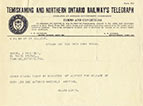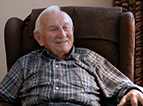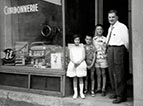The Return Home
I claim damage for injuries sustained to my heart and health and paralysis to my left side for the rest of my life while in the internment camp... You have ruined my health for life. There is no money in the world that can pay for my health. I was an innocent man but you put me in jail and in the camp.
James Poggi, internee, letter to Custodian of Enemy Property, March 29, 1943, Library and Archives Canada
My father didn't mind being out in the woods. They made 20 cents a day… He had his room and board and as long as the family was getting on… He said, "It was two years. My vacation!’"
Esperando Razzolini, son of internee Rodolfo Razzolini, video interview, Columbus Centre Collection
It is difficult to imagine the emotional toll that the internment had on internees and their families. Homecomings were very emotional with tears, joy, relief and, in some cases, anguish. Internees had to reacquaint themselves with spouses and children they had not seen for one year or longer. After the reunion, families resumed their daily routine – making a living, running a business, raising a family – as best they could.
But many internees suffered. The older ones had to endure long-term unemployment, and often the loss of status as former community leaders. Having to rebuild left some internees bitter about their internment. This anger could play out at home. Some fathers returned from camp stricter and less affectionate. Others returned as shadows of their former selves. Physical changes also occurred with internees having lost weight or seeing their hair turn completely grey.
A minority found their time in camp to be tolerable, making the best of the fact that they were housed, fed and far removed from the daily struggles of life as immigrants. However, the one thing internees had in common was their unwillingness to speak of their internment experiences with their families. They preferred to forget. Some reminisced about time in “the college” with their former campmates. But it was more likely that no discussion occurred on the subject. For many families, internment was a forbidden subject.



